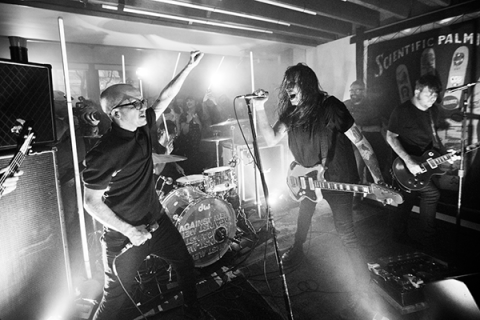
Laura Jane Grace is more than just the frontwoman for American punk rock band Against Me! She is also someone leading a gender identity revolution in a way that has never been done before — from the outside in.
When Grace walked into an interview I did with her back in 2014, she looked at me wide-eyed and said, “Oh my God, it’s you.” I was flattered she knew who I was. Grace and I share a kinship that probably few can understand. We are both rock musicians and bandleaders (me with Toronto’s the Cliks), who came out as transgender at the peak of our professional careers to mass mainstream media attention. Against Me! Formed in Florida 20 years ago and has released seven studio albums.
In May 2012, at the age of 32, she came out as transgender and started the physical transition from male to female, taking hormones, undergoing electrolysis and other necessary steps, including the selection of a new name, Laura Jane Grace. Against Me!’s next album, Transgender Dysphoria Blues, which Grace produced, dealt with gender dysphoria — the psychological distress a person feels when assigned the opposite gender identity at birth — and was finally released in 2016 after a series of lineup changes to the band.
Although Grace and I share some intensely similar parallels in our journeys, there are two places in which we vastly differ. Firstly, in our view of touring; I hate it, whereas she sees it as “a big adventure” and, secondly, in our approach to handling ourselves coming out publicly as transgender and why I believe she’s a revolutionary in normalizing trans people where I could not. Grace unapologetically seduced people into her world, whereas I tried to fight to be in theirs.
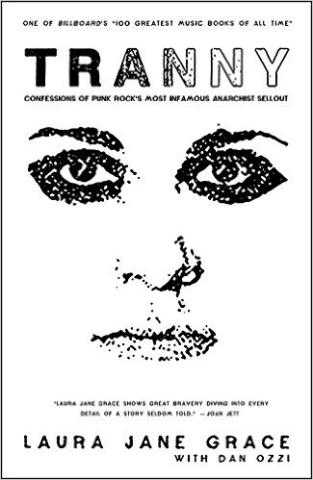
The book reads like a punk song, a rhythm of quick literary punches that leave you feeling emotionally volatile yet wanting more. Most impactful is how the book is intercut with extremely personal diary entries where Grace delves deep into the torture of her very private gender dysphoria, her relationships to music, family, bandmates, lovers, drugs and alcohol and it is all painful and alarmingly beautiful.
In trying to help others with gender dysmorphia, particularly those who sing for a living, as well as people who simply want a better understanding of what transgender people might experience daily, Samaritanmag spoke to Grace about her voice on hormones, using public restrooms on the road, Donald Trump’s views on transgender rights, and whether or not it’s okay for strangers to ask about her transition.
Your book was incredible.
Thank you.
I had to put it down a couple of times because I started getting really emotional while reading it. I felt that our lives paralleled on so many levels — not just the transitioning part, but reading your experiences and touring and all of that. But Samaritanmag is about making a difference, so my questions are in that realm.
Okay, perfect.
We both know transitioning can be a difficult concept for people to understand. How open are you to people asking you questions about your transition, whether they be friends or strangers?
Context is everything, of course. I’m a strong believer in, ‘there’s no such thing as a stupid question,’ but at the same time, there are definitely inappropriate ways to ask questions. You hope for the best as far as contextually. When it comes to interviews, that’s always a mix bag. Yesterday, for example, Adam [Willard, drummer] and I did a short little radio station interview right before the set. The whole time I was praying it didn’t go in that direction where they started asking those kinds of questions because the rest of it was all superficial shit. You’re like, you can’t just casually throw in some question about dealing with substance abuse, depression or the negative things I came from, like living in the closet or whatever you’re dealing with privately or stuff like that.
So context is very important. At the same time, I do try to be an open-book most of the time, but I already put myself so out there. I’m pretty numb to it. As a defense mechanism, I accepted that I need to be unflinching because often times there will be people in life who will try to make you flinch and you can’t react in a way that like…I can’t punch this person or I can’t [be] like, ‘Fuck you.’ Sometimes you’ve got to just prepare to take that, unfortunately.
But I feel relatively comfortable with it too, having had years and years of media experience prior to coming out. The best piece of advice I was ever given by a publicist, when it comes to doing interviews or being asked questions, is don’t answer the question you were asked; answer the question you wished you were asked. So people can ask me whatever they want and that doesn’t mean you have to answer them directly or even to answer them at all when you’re answering them. You can say what you’re going to say. But I feel relatively comfortable just because it’s the truth. So as long as I just answer from my experience and what I know, then it’s not a wrong answer per se.
So it’s pretty okay. And when it’s a one-on-one level with like a kid after a show or something like that, I really feel like you’re really making a connection and you could possibly be really helping someone, so I try to put myself out there.
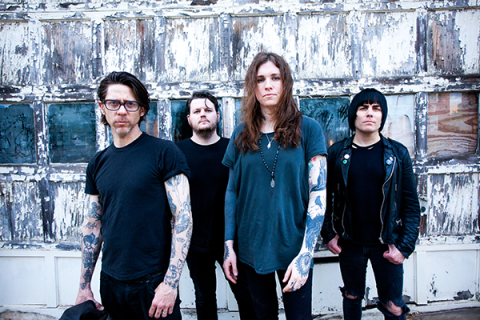
That’s a really complicated question because I always felt, going into it, I don’t have the option ever of being stealth. I have had a lot of records and I have my ‘dead name’ [birth name] in it and I have a solo record with my dead name. You know, there’s years and years and years of YouTube videos of me doing interviews or being that way or magazines or pictures online from before I came out. So I had to accept that I couldn’t scrub the internet clean and I couldn’t scrub people’s memories to where they forgot that. I had to just accept that. That was really useful in many ways, even with the transition aspect of accepting you have a past.
That makes a lot of sense. I know the feeling. It’s interesting because it’s an issue for a lot of trans women. And there was actually something in the book where you talked a lot about how you were concerned that you were never going to pass or be seen as a woman. You said something along the lines that the thing that you feared the most was looking into the mirror and never actually believing in yourself. Do you feel that that’s something that you’ve come through? You can look at yourself and say, “I am a woman”?
All those learning lessons definitely contributed to me realizing that I couldn’t scrub the past. I have to accept these things, I have to accept what happened — even in the time between coming out and getting ID changed — of, well, you have a dead name that you wouldn’t like to use anymore, then eventually coming to a phase of realizing it is just a name. I cannot rely on these things, whether that’d be a name change, whether that’d be surgeries, whether that be hormones; I cannot rely on these things to substantiate me as a person and be accepted about my gender of who I am. That’s the point — that I’ve always known who I was; I just had a long time trouble accepting that.
So there’s that side of a personal acceptance about it, which is always really important too before you pursue any surgeries because as my friend Bailey Jay says, “Plastic surgery can’t fix a broken soul.” But at the same time, on a civilian level, it’s really nice that I have the privilege and the comfort of being in a locked van and having the four of us traveling, fairly isolated, and not having to deal with a lot of the other bullshit people would go through, or deal with, if they were going to a closeted experience. I do have a civilian life, where I realized most of the time people don’t read me as female; sometimes they don’t even read me as him. Sometimes I think people look at me, and they just read me as younger than I am because I don’t have a fucking beard, you know? “Oh, you’re so fresh faced, you must be in your early 20s.” So you’re taking the path of least resistance. I’m not going to correct them. I’m not going to deal with this. But I have come to the general realization that it sucks often times, realizing, “Wow, unless I’d have fucking facial feminization surgery, people are never going to stop saying, ‘Hey, man. What’s up guys?’ You’re never going to get past that with most people.
A related example of that is my friend Marie who was on the cover of Time magazine [recently] — the title next to their picture on the cover is ‘Beyond He or She’ — I’ll forward that to people and I’ve had some come back and be like, “Oh, that’s really great for her.” And it’s like, “Are you deaf? This whole thing is about not asking people’s gender.” But again, you can’t let other people make or break your acceptance of yourself and that’s an important learning lesson.
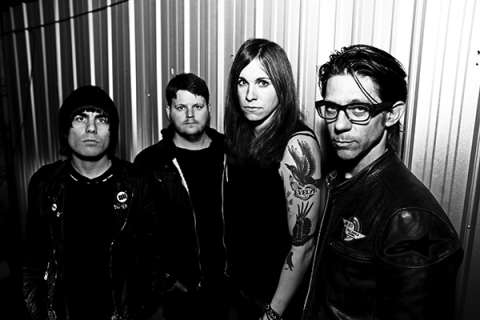
Going on to something more musical. This is something that I’ve never really had experience with because I’ve never known any other trans female singers. Does anything happen to you vocally after starting estrogen?
No, it doesn’t work like that. Testosterone lowers your voice, but the estrogen doesn’t affect you in any way, no.
Are you comfortable with your voice? I know that some people talk about shaving their vocal cords.
That’s so nerve-wracking. It makes me weak in my knees when I hear about that.
I heard about that and, for me, it was horrifying to think about taking T [testosterone] and everybody told me that I wasn’t going to be able to sing, so for five years I didn’t take testosterone because of it. And then I was told that once my voice deepened that it couldn’t be reversed. But, before that I always wondered. Do you want your voice to sound different or do you like the way your voice sounds?
It’s tough because on the one hand — I’m sure, as you know, as a singer — there’s certain things the voice will do that you cannot fucking change, like my voice is different in the morning than my voice is at night after I played a show. It changes for me like that, just from the uses of it. And if you listen to my band’s records over the years, my voice has changed just because if you do 200 songs a year, your voice will fucking change.
Yeah, my voice does the same thing.
And on top of that, whatever kind of partying or smoking affects you. I feel like this relates to one of the things you were talking about a second ago — questions. I was doing a signing somewhere in the Pacific Northwest and there was a trans woman who was waiting in line in the signing and they were like, “Do you ever plan on trying to change you voice?” And I was so depressed because I was like, “Oh fuck. I’m actually trying to right now. I guess they’re just telling me I’m not doing a really good fucking job.”
It’s something from a vocalist perspective, the idea if you practice, then you can develop your range, control your voice. That’s a valuable tool, but at the same time I love my singing voice. I feel so empowered when I sing. I wouldn’t do anything that could hurt that and especially from a surgical perspective. I have thought, “If I ever have trouble with polyps, I would definitely talk to the doctor.” If I was already going in for some surgery related to what the realities are there, so what could happen? But my voice is an instrument that I rely on a professional level. I’m sure you can relate.
For sure. I love your voice. It’s fantastic and it’s beautiful. So it’s all about perception. I remember when my voice changed, I had a lot of people say, “Oh, I liked your voice better before.” And I was just like, “Really? You need to say that to me right now?”
Right.
Yeah, it was through those moments where I was just like, “That’s about them. That’s not about me.” If somebody is listening to you and they’re perceiving your voice as being anything else other than female, that’s their problem because they’re not seeing you for who you are.
Exactly. One hundred percent.
I’m going to bring this back to the state of your country right now with Trump. He’s obviously doing some really backward things, especially in relation to you being a trans person. From what I hear, he’s trying to reverse the Bathroom Bill [the name given to legislation that defines access to public restrooms for transgender individuals, usually their gender identity]. In February, his administration rescinded Obama’s law [Title IX] providing protections for transgender students.
How do you feel as a person who’s touring across the United States having to use public bathrooms, having to use bathrooms backstage, and just being a trans person period? Has your feeling of safety changed at all between the time that Obama was in power and we saw things going forward, and now with Trump?
Completely. A while back, when Obama was in office, there was a moment when the Attorney General [Loretta Lynch] gave a press conference [May 9, 2016] saying the Obama administration recognizes transgender people and we want you to know we have your back and we’ll fight on your behalf. That was the moment — I never thought I would experience anything similar to any kind of validation from a federal government on that level — and it did feel like tides were turning, and people are becoming more accepting of that. At the same time, I still saw there’d been so much need for that and so much further to go.
Definitely with Trump, it feels like a real step backwards with all that, but it’s hard because the Trump administration, I feel like it’s attacking the U.S. and the world on so many different levels. It’s hard to be like, ‘I’m specifically enraged about transgender issues and the Trump administration,’ while they’re completely dismantling the environmental protection agencies. So, while I would really like to be able to use the bathroom that corresponds with my gender identity, I would also really like to be able to breathe the air and drink some water. It’s so fucking hard to focus on one thing, which is really the fucked-up part.
But I feel like the bathroom stuff is always so complicated for me where I’ve had anxiety around restrooms as early as I can remember, starting with going to public school. I always felt unsafe in public restrooms and depending on the situation, you were some kind of target for harassment, no matter what. That’s never really changed. That’s obviously only intensified with coming out as trans. I definitely try and wait for a second option, just because of the privacy. Even from a minor celebrity level, I’m terrified of the idea of being recognized in a restroom and having that be someone’s memory of me, “Oh, we met in a restroom.” I don’t want that interaction with people; I want privacy.
So, honestly, I used to really rally against Starbucks and talk a lot of shit about Starbucks, but Starbucks usually has pretty decent restrooms [single stalls and non-gendered]. That becomes your restroom away from home, if you will, when you’re traveling on the road. But it’s never a black and white thing for me. It’s just when I’m going out somewhere, I think, “Okay, what’s the restroom situation there?” and because I just fucking sometimes don’t want to deal with people’s shit. I don’t want to fucking deal with having that even be an issue, and sometimes that makes it not worth it, unfortunately.
I know the feeling intensely. I love that you mentioned Starbucks because I remember when we were on tour, it was always our bathroom of choice.
Yeah. Airports are usually pretty decent as far as they’re being decent options so that makes it easy. And again, I know I have the privilege of a tour bus; I have a backstage restroom, but in an ideal world there will just always be a unisex option.
Absolutely. When our lives are so complicated by the simplest thing, like having to go pee…
Yeah, it’s ridiculous.
It’s a privilege that people have that they don’t even recognize. Something so simple, that for us becomes so intensely affected to the point that we don’t socialize like you just said. So I feel you. I want to thank you so much for speaking with me. I’m going to be over at George Stroumboulopoulos’ house for your set.
Hey, you don’t want to do a song with us, do you?
Sure. I would love to.
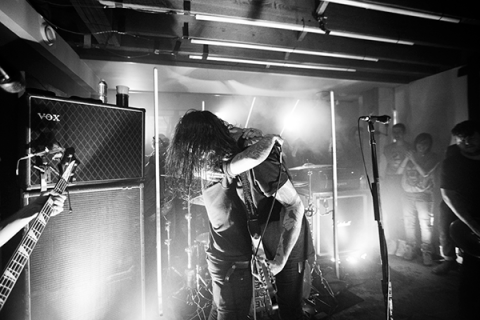
Oh my god, I would love that. I would love that. Oh my god. That’d be so awesome. Yeah, so the answer is yes. I’ll think about it. Oh my gosh, I just got really excited for a second. I guess I’ll text you and we’ll figure it out. But again, I don’t know how often you hear this, but from one trans person to the other, and from one human being to the other, I am so proud of you. I’m so proud of everything that you’ve done and that you’re doing and the person that you’ve become and what you’ve done for our community and just for humanity period. You’re killing it. Just keep doing it.
Right on. You’re going to make me cry. I really appreciate the things that you said. I really appreciate the fuck out of you as well, so thank you.
* The House of Strombo, featuring a full Against Me! set in host George Stroumboulopoulos’ living room — and including the song Lucas Silveira sang with the band, “The Ocean” — will be released online sometime in April (TBD).
Air Jordan 1 GS